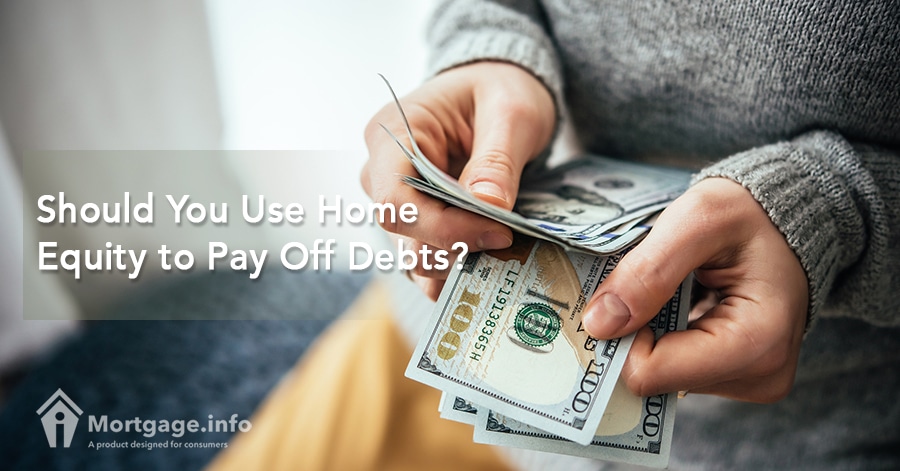If you are tired of getting nowhere with your high-interest credit card debt, you may have thought about tapping into your home’s equity. You have the room, so why not put that home equity to good use, right? Then you can finally get yourself out of debt.
Looking for Current Mortgage Interest Rates? Click Here.
Before you proceed, you should know the pros and cons of using your equity to pay off debts. In many cases, it does make sense. It helps put you back in control of your finances and helps you pay off those pesky debts. But, understanding the ramifications of doing so is a part of making smart financial decisions.
Benefits
You’ll Likely Save Money on Interest
If you are like most other credit cardholders, you pay interest rates somewhere in the 20% range. That’s a lot of interest every month. If you only make the minimum payments, you barely touch the surface of the principal. The longer you have this money outstanding, the more it costs you in interest. It can feel like a never-ending battle.
If you wrap those debts into your home equity, though, you’ll likely get a much lower interest rate. Whether you take out a HELOC or a cash-out first mortgage refinance, your interest rate will likely be just slightly higher than a standard first mortgage. It’s safe to say that’s nowhere near the 20% interest your credit card charges. Saving that money could help you tackle the principal amount faster.
You can Borrow More Money
You might have thought about transferring your credit card debt to a 0% balance transfer card. But, the amount you can borrow is limited. If you have several credit cards, you may need several balance transfer cards to help you pay them all off. If you only pay some of the cards, but leave others with the high interest rate, you’re not in a better position.
A home equity loan or cash-out refinance may leave you privy to taking out more money. The amount you can borrow depends on the value of your home. Usually lenders allow you to borrow up to 85% of your home’s value as a second mortgage. If you have sufficient equity, you may be able to consolidate all of your debt, getting yourself out of consumer debt quicker.
You’ll Only Have One Payment
If you have many debts, it can be hard to keep up with them. Keeping the due dates straight and determining the amount you can pay to each to get them paid off can be overwhelming. Consolidating all of your debts into one payment can put an end to that madness.
Each month you’ll make one payment to the mortgage company, which will cover all of the debts wrapped into it. This can help you keep track of what you owe and maybe even allow you to make extra payments towards the debt paying it down even faster.
Disadvantages
It Puts Your Home at Risk
Your unsecured credit card debt didn’t have any collateral tied to it. You could stop making your payments and no one would come take your home from you. The creditor could take you to court, but it usually takes a long time before it gets to that point.
Click to See the Latest Mortgage Rates.
When you wrap the debts into your mortgage, though, your home becomes collateral. If you miss payments, you put your home at risk of foreclosure. If you are unsure if you can afford the mortgage payment, it might be best to keep the debt unsecured and make payments as you can. There’s much more risk involved when you tie the debt to your mortgage.
You Could Go Right Back Into Debt
Wiping out your credit card debt might not be the best idea if you don’t have self-control. If the thought of empty credit cards with full available balances makes you want to shop, consider other options for debt control.
Just because you wipe your debt out doesn’t mean you should rack up those credit cards again. What you should do is put them away for an extreme emergency. Don’t touch them unless you have no other way to pay for something that is imperative, like fixing your car or replacing a broken down appliance. If you let yourself get back into debt, you’ll have twice as much debt and no way out of it.
You May Pay More Interest
This sounds counterintuitive. If you get a lower interest rate by securing your debt into your mortgage, how will you pay more interest? It depends on the length of time you borrow the money. Let’s say you do a cash-out refinance and borrow the money for 30 years. That’s 30 years of interest payments. This could add up to be much higher than what you would have paid if you paid your credit card debts off sooner.
Of course, if you only make the minimum payments and have significant amount of debt, your credit cards could end up costing much more in the end.
Whether you should consolidate your debt into your home is a personal decision. Determine what you can afford and what habits you’ll have after you consolidate. If you think it will work out for the best, go for it. You likely stand to save a significant amount of money. If you are unsure though, evaluate your options and determine which option will work to your advantage.

